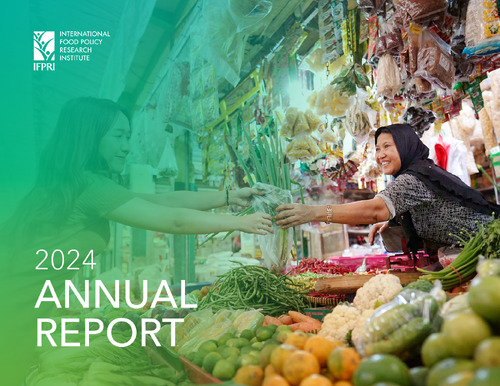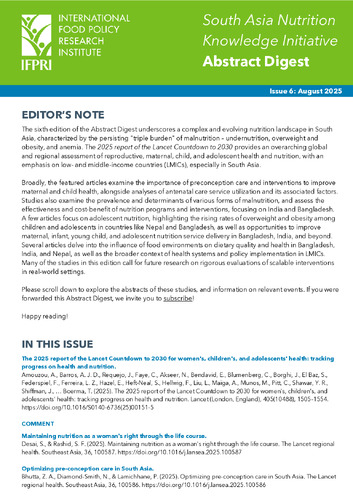South Asia Nutrition Knowledge Initiative: Abstract digest August 2025
The sixth edition of the Abstract Digest underscores a complex and evolving nutrition landscape in South Asia, characterized by the persisting “triple burden” of malnutrition – undernutrition, overweight and obesity, and anemia. The 2025 report of the Lancet Countdown to 2030 provides an overarching global and regional assessment of reproductive, maternal, child, and adolescent health and nutrition, with an emphasis on low- and middle-income countries (LMICs), especially in South Asia.
Broadly, the featured articles examine the importance of preconception care and interventions to improve maternal and child health, alongside analyses of antenatal care service utilization and its associated factors. Studies also examine the prevalence and determinants of various forms of malnutrition, and assess the effectiveness and cost-benefit of nutrition programs and interventions, focusing on India and Bangladesh. A few articles focus on adolescent nutrition, highlighting the rising rates of overweight and obesity among children and adolescents in countries like Nepal and Bangladesh, as well as opportunities to improve maternal, infant, young child, and adolescent nutrition service delivery in Bangladesh, India, and beyond. Several articles delve into the influence of food environments on dietary quality and health in Bangladesh, India, and Nepal, as well as the broader context of health systems and policy implementation in LMICs. Many of the studies in this edition call for future research on rigorous evaluations of scalable interventions in real-world settings.
Please scroll down to explore the abstracts of these studies, and information on relevant events. If you were forwarded this Abstract Digest, we invite you to subscribe!
Happy reading!
Authors
International Food Policy Research Institute
Citation
International Food Policy Research Institute. 2025. South Asia Nutrition Knowledge Initiative: Abstract digest August 2025. SANI Abstract Digest August 2025. Washington, DC: International Food Policy Research Institute. https://hdl.handle.net/10568/176011
Country/Region
Bangladesh; India; Nepal
Keywords
Asia; Southern Asia; Child Nutrition; Dietary Diversity; Literature Reviews; Maternal Nutrition
Access/Licence
Open Access








